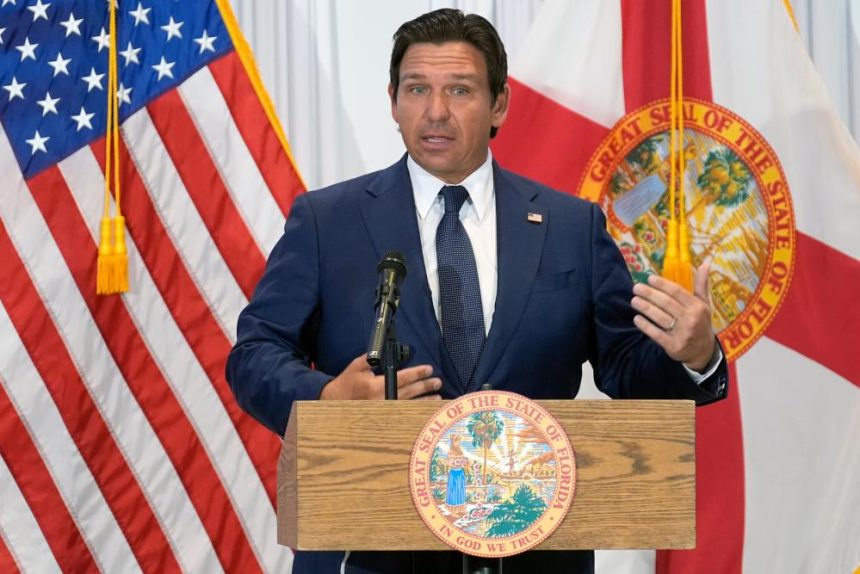Florida’s Republican governor, Ron DeSantis, said on Thursday that the state will open a second immigration jail, as a federal judge weighs whether to close the controversial existing facility in the Everglades known as “Alligator Alcatraz”.
DeSantis painted the forthcoming detention center at the shuttered Baker correctional institution in Sanderson as supplementary to the remote tented camp. He also said the facility would hold up to 1,300 undocumented immigrants awaiting deportation.
“We need additional capacity beyond what we’re already doing down in south Florida. There’s a massive part here at Baker that isn’t being used. [It’s] ready-made infrastructure,” DeSantis announced during a press conference at the disused jail 50 miles north of Gainesville.
Baker was closed in 2021 after numerous reports of excessive violence and abuse of inmates by guards.
The governor gave no timeline for its opening, but said the facility, which he said would be called “the deportation depot”, would be operational soon.
“We’re not rushing to do it right this day, but they’re doing what they need to do to get it done with all deliberate speed,” he said.
“It’s a priority for the people of this state, it’s a priority for the people of this country.”
The development came on the heels of district court judge Kathleen Williams hearing final arguments in Miami on Wednesday in a lawsuit filed by an alliance of environmental groups seeking to close Alligator Alcatraz.
Related: Ice deported boy with cancer and two other US citizen children to Honduras, suit alleges
The six-week old facility has been beset by allegations of “inhumane” conditions including detainees held in cages in excessive heat, broken toilets and air conditioning, inadequate food, and a claim this week that a respiratory virus was running rampant.
Williams last week issued a two-week restraining order halting new construction at the Everglades detention facility, while allowing operations there to continue. She said she would decide whether to renew it before its 21 August expiration.
In a statement, the Center for Biological Diversity, one of the plaintiffs claiming the camp was causing irreversible destruction to the ecologically sensitive wetlands, said it was “optimistic” that the Alligator Alcatraz facility would be closed while the lawsuit proceeds.
“We’re feeling hopeful that the strong case we’ve made over the last few days will move the court to pump the brakes on this dangerous detention center,” said attorney Elise Bennett, the group’s Florida and Caribbean director.
DeSantis made no mention of the lawsuit on Thursday, but confirmed the state’s emergency management department, which operates Alligator Alcatraz on behalf of the Immigration and Customs Enforcement agency (Ice) using a range of private contractors, was working in haste to have the camp at Baker opened.
“We’re taking yet another step in supporting the important mission that President Trump was elected to implement, securing the border and enforcing immigration laws, and removing illegal aliens,” he said.
DeSantis highlighted a number of other steps his administration had taken, including banning so-called sanctuary cities for undocumented immigrants and forcing state law enforcement agencies to support or participate in Ice actions.
“We have done more on this than any other state by a country mile,” he said.
DeSantis said he had originally looked at opening an immigration jail at Camp Blanding, a joint military training base west of Jacksonville, but his staff had concluded that Baker was a better option because it was a “one-stop shop” close to Lake City airport and its longer runway.
“The reason is not to house people indefinitely; we want to process and return illegal aliens to their home country. That is the name of the game,” he said.









